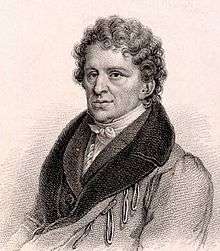Jean-Nicolas Bouilly

Jean-Nicolas Bouilly (24 January 1763 – 14 April 1842) was a French playwright, librettist, children's writer, and politician of the French Revolution. He is best known for writing a libretto, supposedly based on a true story, about a woman who disguises herself as a man to rescue her husband from prison, which formed the basis of Beethoven's opera Fidelio as well as a number of other operas.
Life
Bouilly was born near Tours, and was briefly a lawyer for the parlement of Paris. At the outbreak of the Revolution he held office under the new government and was head of the military commission in Tours during the Reign of Terror.
In 1795, he served as a member of the Committee of Public Instruction having a considerable share in the organization of primary education, but retired from public life four years later in order to devote himself to literature. Bouilly died in Paris.
Works
Bouilly's numerous works include the opéra comique Pierre le Grand (1790), with music by André Ernest Modeste Grétry and the opera Les deux journées (1800), with music by Cherubini.
Others are:
- L'abbé de l'épée (1800)
- Causeries d'un veillard (1807)
- Contes à ma fille (1809)
- Les adieux du vieux conteur (1835)
His Leonore (1798) forms the basis for the libretto which Ludwig van Beethoven used for the opera Fidelio; it was also set by Pierre Gaveaux as Léonore, ou L’amour conjugal, by Simon Mayr as L'amor coniugale, and by Ferdinando Paer as Leonora.
In 1836 he published an autobiography.
Quote
- "Whatever we possess becomes of double value when we have the opportunity of sharing it with others."
References
 This article incorporates text from a publication now in the public domain: Chisholm, Hugh, ed. (1911). "Bouilly, Jean Nicolas". Encyclopædia Britannica (11th ed.). Cambridge University Press.
This article incorporates text from a publication now in the public domain: Chisholm, Hugh, ed. (1911). "Bouilly, Jean Nicolas". Encyclopædia Britannica (11th ed.). Cambridge University Press.
External links
- Works by Jean-Nicolas Bouilly at Project Gutenberg
- Works by or about Jean-Nicolas Bouilly at Internet Archive
- Bouilly article on the CÉSAR site
|